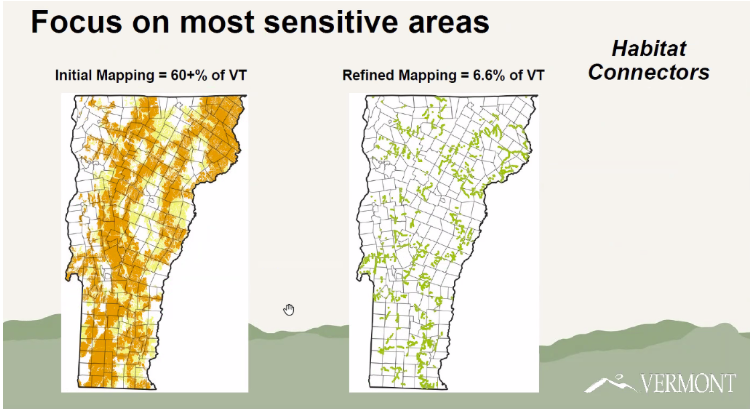Thank you to this week’s sponsor of our Advocacy Update:
October 28, 2025
As October disappears quickly, the 2026 Legislative session is rapidly approaching. LCC is having conversations and laying the groundwork to deliver on our members’ priorities in 2026. If you have questions or concerns about the coming legislative session, please contact our advocacy team at [email protected].
In this update;
- Join us for our signature speed networking event with policymakers
- Save the date – first legislative breakfast Jan. 26th at Back Nine Indoor Golf
- Governor releases 14-point plan for Burlington public safety
- Federal funds frozen for food and fuel
- The session ahead – in one word – uncertainty
- New Act 250 land-use mapping shows issues with past legislative compromise
- The Laundry List
Join Us for Our Last Signature Speed Networking Series Event – Nov. 6
LCC has taken on our signature Legislative Speed Networking with great events at the Spanked Puppy and Vermont Frames. There is still time for you to experience the last event in the series. Join us on November 6th at Generator to connect with a curated selection of legislators from our region. We’ll kick off with structured networking, with legislators rotated through tables of LCC members. Upon rotating legislators through each table, we break into informal networking.
Confirmed policymakers:
- Senator Martine Gulick
- Senator Thomas Chittenden
- Representative Carol Ode
- Representative Tiff Bluemll
- Representative Abbey Duke
- Representative Shawn Sweeney
- Representative Bram Kleppner
- Sara Teachout, Member, Green Mountain Care Board
Save the Date – First 2026 Legislative Breakfast – January 26th at Back Nine Indoor Golf
LCC is excited to share that our first Legislative Breakfast of 2026 will be held at Back Nine on January 26th at 8:30 a.m.
Back Nine Indoor Golf Lounge features 9 Full Swing Pro 2 Golf Simulators and a 10,500-square-foot Lounge. What an awesome location to meet and greet your legislators!
Stay tuned for more details and the date of our second breakfast in the series.

Governor and Mayor Reach Agreement on Short-Term Burlington Actions
Governor Phil Scott released a 14-point short-term plan on Thursday to address crime, disorder, and public safety challenges in Burlington.
- Developed in coordination with state and local partners, the plan focuses on accountability, treatment, and downtown revitalization over the next 3–4 months.
- It does not include new shelter capacity or direct housing initiatives is grateful for the Governor’s leadership and the collaborative work between the Governor and Mayor. While this is just a start, this represents an important response to the relentless advocacy of many downtown business owners and residents, LCC, and other business organizations.
Key Actions in the Plan Include:
- Community Accountability Court:
- Launch of a 90-day pilot docket in Chittenden County Superior Court to expedite cases for individuals with five or more open criminal charges to reduce case backlogs and create a model for replication in other counties.
- This will be overseen by retired Judge Martin Maley, with special prosecutor Zach Weight, a public defender, and dedicated court staff.
- Pre-Trial Supervision and Corrections Treatment Expansion:
- The Department of Corrections will expand pre-trial supervision to Burlington, building on pilots in Essex and Orleans counties. LCC advocated successfully for this legislation in 2024 and we are thankful to see pre-trial supervision being implemented in Burlington.
- The program focuses on high-risk defendants who have violated release conditions or have multiple pending cases, offering structured supervision and support while awaiting trial.
- Enhanced substance use treatment in correctional facilities, including therapy, medication-assisted treatment, recovery coaching, and expanded hours and assessments to mirror community-level care.
- Policing and Enforcement Collaboration:
- Vermont State Police resources offered for foot patrols, marked units, and high-visibility presence in coordination with Burlington Police.
- Coordination details between state and local police are still being finalized.
- State-funded service providers have been directed to contact law enforcement when confronting violent or disruptive behavior near their premises.
- City ordinance enforcement will be strengthened through the City Circle program, which can refer noncompliant offenders to restorative justice.
- Public Health and Harm Reduction:
- Partnership with syringe service providers to explore incentives and accountability measures for syringe disposal, aligning with a recent City Council report urging greater provider responsibility for cleanup.
- Collaboration between the Department of Health and the Agency of Human Services to improve syringe cleanup and community safety.
- UVM to deploy an additional mobile addiction treatment van targeting both opioid and stimulant disorders.
- Downtown Revitalization and Community Engagement:
- The Agency of Transportation will advise Burlington on ongoing construction and traffic management projects, including those affecting Main Street.
- The state, city, and University of Vermont will coordinate a citywide cleanup and beautification effort to support downtown recovery and improve public perception.
Federal Shutdown Freezes Federal Food and Fuel Funds
Catch up quick: The federal government shut down on October 1st after Congress failed to pass a FY2026 funding bill, halting or scaling back operations across many agencies.
Federal food funds: If the shutdown continues, 42 million Americans could lose access to SNAP food benefits in November. The USDA hasn’t said whether it will tap its $6 billion contingency fund to cover next week’s payments.
- 60,000 Vermonters receive about $12 million in monthly food assistance.
- October benefits remain valid, but November payments won’t go out without new federal funding.
- Even state intervention may not help if EBT transactions can’t be processed during the shutdown.
Federal fuel funds: Heating aid (LIHEAP) for 15,000 families is also in doubt, with only $2 million left from last year’s budget.
- The state’s fuel assistance office says it will seek to backfill with state funds if federal dollars don’t arrive.
What’s next: The Vermont Emergency Board, the Governor, and four legislative finance chairs, meet this week to discuss contingency plans.
- Numerous Attorneys General have filed suit against the Trump Administration for not using program reserve funds to keep the program functioning, including Vermont’s AG, with the support of Vermont’s Republican Governor.
UPDATE: The Vermont E-Board approved state funding through November 15th. Read more via VTDigger.
The Year Ahead – In One Word – Uncertainty
As Vermont heads into a new legislative session, one thing is clear: uncertainty will dominate.
- Healthcare, education, and public safety are expected to be the defining issues of the 2025 session — all set against a backdrop of fiscal tightening and shifting federal priorities.
Budget woes: This will be a difficult year handling federal conformity and fiscal restraint.
- This moment sits between two distinct federal funding eras: the end of the COVID-era one-time funding that created temporary abundance and the onset of federal austerity tied to the One Big Beautiful Bill (OB3) and its potential impacts on states.
- The Agency of Administration is targeting roughly 3% growth across state budgets, while still identifying areas to reduce spending.
- If history repeats itself, Vermont’s Democratic-controlled Legislature may use the OB3 as an opportunity to restructure the state tax code, mirroring the state-level adjustments made after the 2017 federal Tax Cuts and Jobs Act to address perceived inequities.
- Vermont’s General Fund revenues are already showing stress, with sluggish personal income tax receipts dragging down results, and the transportation fund is in deficit.
Healthcare: A great deal of legislation was passed last session to address healthcare costs, the impact of which has been seen in lower rate increases passing through the Green Mountain Care Board compared with recent years, however, there is more work to be done.
- Vermont now has the highest health insurance premiums in the nation ($1,277/month).
- Legislative reforms have achieved short-term cost containment, but structural pressures persist, smaller hospitals face insolvency, and the state’s largest hospital system is being heavily scrutinized.
- BCBSVT faces financial instability, reporting $152 million in cumulative losses since 2021.
- Federal policy changes threaten coverage for up to 45,000 Vermonters.
Education: The massive Education Transformation Bill passed last legislative session is all for naught if the Legislature cannot pull through on a few critical directives from that bill.
- Maps! Maps! Maps! A redistricting taskforce must deliver to the Legislature no fewer than three maps that could limit the number of school districts to less than 20 by the end of this year.
- The Legislature will need to approve a new school district map by the end of the session to continue implementation of last year’s legislation.
Housing: There is momentum after three massive pieces of legislation in as many years to expand housing; however, that much progress makes future progress harder.
- The Legislature will want to revisit some of the provisions of Act 181, which moved Act 250 land use to place-based jurisdiction; however, that will tee up a fight for many rural Vermonters (we get into this below).
Public Safety: Finally, public safety could be a defining issue of this legislative session, as the Governor seeks to advance long-standing priorities that are highly charged during an election year.
- He’s had success building a package that represents consensus in Burlington; can he do it again at the state level?
- Since public safety is atop LCC’s agenda, we’ll be working tirelessly on this item with the support and advice of our Regional Affairs Committee.
Land-use Laws Show Issues with Past Legislative Compromise
Catch up quick: Act 181 moved the state to “place-based jurisdiction,” with three distinct tiers of jurisdiction.
- Tier 1 areas will be areas of no or limited Act 250 jurisdiction and currently are projected to make up somewhere in the ballpark of 5.4% of the state, though with Chittenden County projected to be about 11.4% tier 1, that brings up the average.
- Tier 3 areas are those with automatic Act 250 jurisdiction and will be much more difficult to build in moving forward because they represent more fragile or important environments.
- Tier 2 areas are everything that is not Tier 1 or Tier 2, and here, the Act 250 status quo remains, but there is also the addition of a road rule.
What’s a road rule? Under Act 181, the construction or redevelopment of paved surfaces meant for cars to move more than 800 feet on a single new road or a combination of new roads and associated driveways is over 2,000 feet.
How this has affected mapping: Initial mapping could have covered ~60% of Vermont by attempting to cover all of the state’s “sensitive areas” as laid out by statute.
- However, after consideration of the effect of the road rule, the members of the LURB determined that since you would need a road to reach some of those areas, Tier 3 only needed to cover 4% to 8% of the state.

The potential crux: Even if you hope to build exclusively in tier 1 areas, the road rule dynamic will affect you. With so much of the state now unbuildable or pulled into Act 250 by the road rule, many legislators will understandably be open to repealing it and want to force that into any conversation about land use.
- Deja vu? Last year, we had a similar situation, in which many legislators hoped to repeal the Clean Heat Standard, and knew that their chance to get an up-down vote would be to propose a floor amendment on any piece of legislation relevant to the issues. This resulted in difficulty in working on energy policy. This is exactly what we could see this year.
Questioning accounting: The layers of land conservation and regulations raise reasonable questions—what percentage of Vermont can be built on? Consider all of the non-overlapping provisions there are.
- The road rule could account for up to +50% of Vermont
- Tier 3 could be up to 8%
- We have legislation seeking to conserve 30% of the state by 2030 and 50% by 2050.
- There are other areas regulated to prevent such as wetlands, endangered species areas, flood zones, and more.
Want to learn more – email us at [email protected]
The Laundry List
- The Governor appointed Lyle Jepson as the new Commissioner of the Department of Economic Development and Nick Grimley (a longtime collaborator of the Chamber) as Deputy Commissioner to fill the vacancy created when Joan Goldstein moved to the Vermont Economic Development Authority. Read more here. Congratulations to Lyle and Nick – we look forward to working with you in the new capacity.
Hey! You read the whole update. You probably have some thoughts on the content or how we delivered it. Feel free to reach out to us at [email protected].


